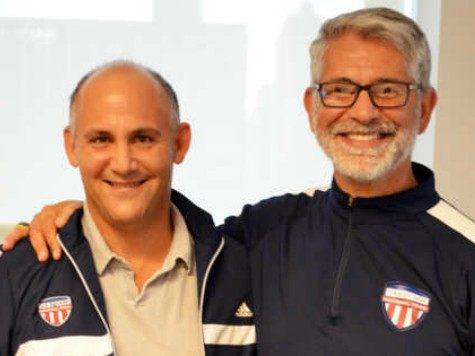David Ganek asked $44 million for his Park Avenue home earlier this year. U.S. Squash received $2 million from him to fund a coach earlier this week.
The day before Foxcatcher hit screens, U.S. Squash announced a sugar daddy—without, presumably, the deadly drawbacks of John du Pont—in Ganek. The hedge-fund manager, who met his wife playing the game at Franklin and Marshall College, donated $2 million to support a permanent, paid coach for the American national squash team. It’s the largest gift ever received by the sports organization.
“Paul [Assaiante] is the ideal choice for this important coaching role that I hope will elevate the US’s standing in the international world of squash,” Ganek said in a statement posted by U.S. Squash. “Squash has played an important role in our lives, and after playing for so many years, this is now an exciting way to continue a growing involvement in a sport we love.”
The sport he loves wasn’t loved enough by the International Olympic Committee, which voted for wrestling over squash for the 2020 Summer Games. But sasquashians like Ganek look to boost the aerobic racket sport in the United States, whose teams have never won, placed or, showed at the big-ticket international event, thinking that doing so will boost the sport globally. They still hold out hopes for some kind of Olympic dispensation. The sport’s votaries can surely afford to pay the price of any offered indulgence, which the IOC has been known to put up for sale, to stage the sport in Tokyo.
The timing of the donation with the release of Foxcatcher surely invites unfair juxtapositions of Ganek with the sports-obsessed nutter. His generosity deserves gratitude, not ridicule. Although the donation doesn’t subsidize cancer research or college scholarships, it doesn’t bankroll huffing paint, either. Good for you and good fun, the walled-in racquet sport appeals to the affluent perhaps because it efficiently provides a taxing workout without taxing their time (time is money, you know). Squash players do well. Ganek did good. Though the philanthropy conjures up images of Steve Carell with a proboscis prosthesis, it shouldn’t.
Another Hollywood production comes more readily to mind when one has squash on the brain. Oliver Stone memorably depicted misanthropist Gordon Gekko playing the game in Wall Street to convey the opulence of the corporate raider. Before making headlines with his squash donation, Ganek figured in the wrong kind of headlines through an insider-trading scandal at his firm that sent the FBI knocking, his partner to the penitentiary, and his once multibillion-dollar business under. Certainly a daily game of squash served to evaporate the stress rained down by the intimidating three-letter-agency.
Whereas basketball reigns in Harlem, squash plays as the sport of tycoons at the other end of Manhattan. Wall Street loves squash. Federal Reserve chairman Ben Bernanke plays. So does Comcast CEO Brian Roberts. The sport’s enthusiasts make golfers look ghetto.
U.S. Squash reports that participants pull in an average of $300,000 annually and that 98 percent of them boast college degrees. The group informs, “Squash players are business owners and senior executives in upper management throughout corporate America along with research physicians, architects, attorneys, and accountants.”
And all along we thought construction workers and bouncers populated the 3,500 rectangular squash cuboids across America. Apparently, they don’t play racquetball, either. And if any can sensibly articulate the difference between the two, they deserve a spot in David Ganek’s tax bracket.

COMMENTS
Please let us know if you're having issues with commenting.